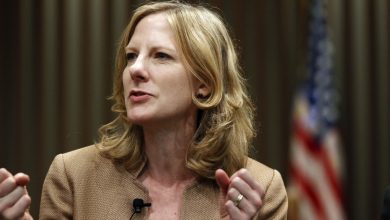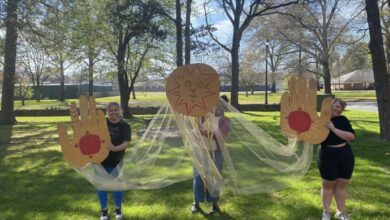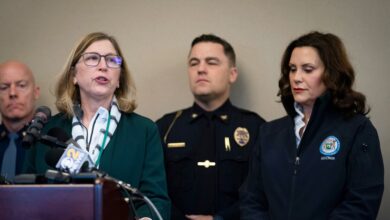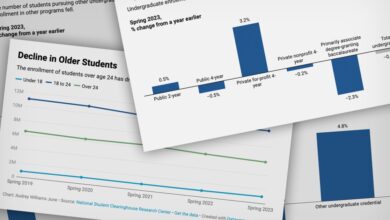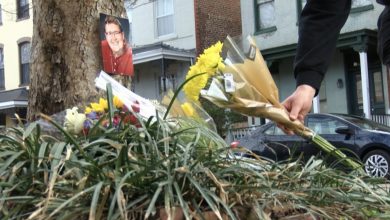Why One College Is Hiring a ‘Vibrant-Campus-Community Coordinator’

Calling all prospective student-affairs leaders: This small college is looking to hire someone who can restore “a vibrant student life” to its rural campus, post-pandemic.
With (preferably) a master’s degree and an “energetic, dedicated, progressive, and student centered” attitude, you could be the new vibrant-campus-community-coordinator at the University of Virginia’s College at Wise, at a salary of $39,000 per year. The college was founded in 1954 as part of the University of Virginia, to support local students.
While most colleges have staff members dedicated to community engagement, “vibrant” is not typically in the job description. So why that word choice?
Building a vibrant campus has been part of UVA-Wise’s strategic plan for years. But the pandemic set back those efforts, said Robbie Chulick, assistant dean of students.
“I think a vibrant campus, especially at a small public institution, is all about collaboration,” said Chulick, who is leading the effort to hire the coordinator. This means teaming up with different offices to support campus events, he said, as well as “making sure that we have enough going on for our students to feel like they can be engaged outside of the classroom,” both during the week and on weekends.
Colleges are dealing with widespread student disconnection after two years of online and hybrid learning. Investing in student life is an effective antidote, said Eric Lambert, executive director of the Association for the Promotion of Campus Activities, an organization that hosts conferences and training programs and helps student-life offices plan events.
“Students will pay their tuition where they think they’re going to have the best experience,” Lambert said. But from what he’s observed, many colleges are taking money away from campus activities and leaving those departments to do more with less.
The pandemic “stunted” students’ relationships with their campuses, Lambert said. And unless colleges rejuvenate student activities, students might remain disengaged and pass that attitude on to the next class, he said. Research shows that more-engaged students are more likely to graduate, and to achieve more postgraduation.
It wasn’t that they didn’t want to be engaged with their peers. It was that they didn’t have the time or the energy, or the emotional energy, that would make engaging in these ways even possible.
“The vast majority of the schools that are going to close in the next 10 years are going to be schools — and it comes from the president’s office on down — that pay no attention to the student-life experience,” Lambert said.
UVA-Wise’s new vibrant-community-coordinator job is a response to students’ recent apathy and an attempt to improve retention. But it’s also directed at a specific issue affecting student clubs: the disruption of leadership transitions since 2020.
“It’s hard enough during a normal academic year to make sure that everyone understands the transition of roles and responsibilities,” Chulick said. “But I think during this pandemic, it’s caused a challenge even more than normal with that transition of power. And we’ve seen some student organizations become inactive at this point.”
‘Hit the Ground Running’
The vibrant-campus coordinator will work to “reinvigorate campus as naturally as possible” by guiding student clubs through marketing and hosting their events, following policies and procedures, and dealing with conflicts.
Thecoordinator will also use a new online platform this fall to display information about student events in one place and collect engagement data, so that students “don’t have to go through multiple emails or multiple social-media pages to see what’s going on around campus,” Chulick said.
bill harcleroad, who spells his name all lowercase, is the director of campus activities and leadership at the State University of New York at Oneonta. He noticed the same disruption in the passing down of knowledge to the next generation of student leaders at his college.
So, in the summer of 2021, he ran a four-week course that trained students in inclusive team-building and walked them through basic logistics, like how to reserve rooms and follow fund-raising policies. In total, 108 students completed the course.
“I was really excited that we were able to, for those students, get them back to a place where they could hit the ground running on Day 1 of the fall semester,” harcleroad said.
And they did. Student clubs posted 64 percent more events in the college’s online portal in the last academic year than they did in 2019, and almost 89 percent of students attended at least one event over the past year.
So far, Chulick has received about a dozen applicants for the position at UVA-Wise. He is hoping to hire someone to start supporting student organizations by the end of September.
Some observers are skeptical that positions like UVA-Wise’s are enough to solve student disengagement. Emily Brier, a writing instructor at Western Carolina University, said a position like this will help some students, like first-years looking to get involved. But larger, structural issues are in play for other students.
“In the past couple of years since the pandemic began, but also even before that, the students who I saw disengaging — not coming to class, sleeping in class, not turning in work — it wasn’t that they didn’t want to be engaged with their peers,” Brier said. “It was that they didn’t have the time or the energy, or the emotional energy, that would make engaging in these ways even possible.”
Students are facing challenges — like working jobs and supporting family members — that make it difficult to engage with campus life, Brier said. The recent job posting for UVA-Wise says the college serves “largely first-generation, often rural students.” And while students might say they want a pre-2020 campus, their 2022 reality has been upended by external responsibilities and global events, like Covid and the climate crisis.
As Brier sees it, positions like UVA-Wise’s should join other systems of support. The College at Wise offers such services, including academic advising and grants, for first-generation students, students with disabilities, and those experiencing financial hardship.)
Students need robust financial aid, including emergency funds and book vouchers, Brier said. They need transparent messaging about the resources available to them, like tutoring and mental-health counseling. And they need professors who have the capacity to help.
“Having one person who works at the university who is checking in on them in a sincere way, or is invested in their future, is a huge predictor for graduation,” Brier said. “So how can we ensure that instructors are not overworked or stretched too thin, where we can actually build relationships with our students?”
Source link


